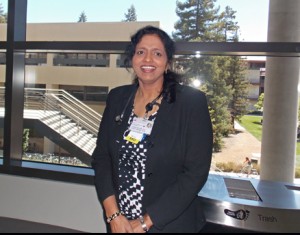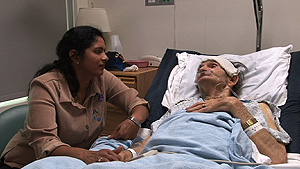Today, SevenPonds speaks with Dr. VJ Periyakoil, an Associate Director of Palliative Care Service, VA Palo Alto Health Care System. Additionally, she is a Clinical Associate Professor of Medicine at Stanford University School of Medicine and the Director of Stanford Palliative Care Education and Training Program. And if she didn’t have enough on her plate already, she also directs the Stanford Hospice and Palliative Medicine Fellowship Program. Dr. VJ Periyakoil specializes in geriatrics, hospice and palliative care medicine. Today, she speaks with us about palliative care for patients at the Palo Alto Veteran Hospital to answer our question: how can we best help Veterans who are dying?
Suzette: Tell us about the evolution of your work.
Dr. VJ: You can say we are pioneers in palliative care [with] the oldest VA hospice program in the country. It was implemented in 1979, before there were national medicare hospice benefits. We had a visionary here who saw the special need[s] for our veterans who are dying. A palliative care program for our Veterans Hospital was created in 1999.
Suzette: What’s different about palliative care from traditional care?
Dr. VJ: First, I’d like to debunk the confusion between hospice and palliative care. Many people mistakenly think it’s the same thing. Hospice is a program of services provided for those who have six months or less to live. Palliative care is the science of all the needs of a patient who suffers a serious illness and need not be dying. It’s about managing everything about that patient, be it pain, non-pain, spiritual, bio-cycle and social. It extends beyond the doctors, the surgeries [and] the medicines into all aspects of their lives.
“I’d like to debunk the confusion between hospice and palliative care. Many people mistakenly think it’s the same thing.”
–Dr. VJ Periyakoil
Suzette: I see, so tell us more about palliative care; how does it offer better care?
Dr. VJ: We treat the patient and their family as a unit of care. We see veterans struggling with with cancer, or a lung disease, for example. They are managing a lot of stress. We want to empower them. Irrespective of what they are going through, we want to add an extra layer of support for their illness and how it’s manifesting in their lives.
Suzette: I would assume veterans deal with dying in a different way, am I correct?
Dr. VJ: Oh, yes. There is a certain trend towards how veterans deal with dying. Many are not afraid to die. In general, they are very stoic and will come right out and ask me, “Am I dying doctor?”
They were trained in the armed forces so they’re in the habit of putting their [health] before the lives of others. In fact, it’s not uncommon for them to refuse a treatment because it’s not covered by insurance. They prefer to not burden their family members with the costs, or [they won’t] want to burden their daughter to bring them in day after day for a treatment.
I find that they also tend to be altruistic. I just had a man who wanted to donate his whole body to science to help understand his cancer better. They’re pretty remarkable!
“They were trained in the armed forces so they’re in the habit of putting their [health] before the lives of others. ”
–Dr. VJ
Suzette: How do you help a veteran have a good death?
Dr. VJ: My bias is to approach a patient as a family unit. If a patient has 20 years to live, they are not an autonomy unit — it’s not just an individual affair, they have family members, sometimes community members.
Let me give you an example: we had a patient here who had a lung disease. He had had a full life of motor biking across [the] country with a large group of friends. They came to visit him one day — all on their bikes — and he wanted to go down and see all of them on the lawn. We accommodated him with [the] equipment and food to be with his friends. People have different rituals.
Suzette: Would you be kind enough to offer us some suggestions for family members who have a loved veteran dying in a VA hospital?
Dr. VJ’s 3 Tip for Helping A Veteran Who’s Dying
1) Better understand how they are coping.
2) Don’t make assumptions, let them lead you.
3) Be open and flexible.
Suzette: Dr. VJ, thank you so much for your time and for our first interview regarding helping veterans at end of life.
Dr: VJ: Of Course, thank you.
Related Articles:
An interview about hospice services and palliative care at UCSF hospital, a book on “The Best Care Possible, A Physician’s Quest to Transform Care Through the End of Life.”

 What is Palliative Care at a Veteran Hospital? An Interview with Dr. VJ Periyakoil
What is Palliative Care at a Veteran Hospital? An Interview with Dr. VJ Periyakoil




 How Dare You Die Now!
How Dare You Die Now!
 Debating Medical Aid in Dying
Debating Medical Aid in Dying
 “Help Me, Helen”
“Help Me, Helen”














